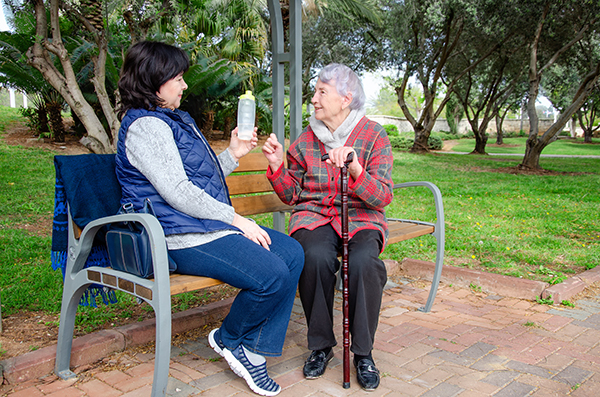 While there are some commonalities, Alzheimer’s disease impacts each individual uniquely. Our highly trained dementia caregivers know, for instance, that while one person may appreciate being outdoors, a different individual may be overloaded by so much sensory input and favor a quieter indoor environment. One person may enjoy a morning bath routine, whereas a bit of creativity is needed to help another maintain good hygiene.
While there are some commonalities, Alzheimer’s disease impacts each individual uniquely. Our highly trained dementia caregivers know, for instance, that while one person may appreciate being outdoors, a different individual may be overloaded by so much sensory input and favor a quieter indoor environment. One person may enjoy a morning bath routine, whereas a bit of creativity is needed to help another maintain good hygiene.
We also recognize there are certain triggers that may often exacerbate the challenging aspects of Alzheimer’s disease. Family care providers should be especially careful in order to avoid the following when caring for Alzheimer’s in a senior loved one:
- Dehydration. Those diagnosed with dementia might not be in a position to identify when they’re thirsty, or may refuse when provided fluids. It’s crucial to ensure appropriate hydration to avoid further confusion and weakness. Plain water is the best, nonetheless, if rejected, try flavored waters, along with different types of cups or bottles.
- Isolation. Individuals diagnosed with dementia experience loneliness as much as anyone else, and without adequate social stimulation, can become increasingly agitated or paranoid. An established care provider, like those at Generations at Home, who are fully trained in dementia care, can offer appropriate socialization, giving members of the family a much-needed break from care.
- Sugar. It’s not unusual for those with Alzheimer’s disease to have a heightened desire for cookies or cake, along with other sugary snacks, but it also can produce additional irritability. Try offering a variety of healthier choices, like fruit, yogurt, or sugar-free treats.
- Sleeping pills. With the challenges of common sleep problems such as sundowning, it could be tempting for family members to supply sleeping pills to a loved one with Alzheimer’s to encourage a more restful night. However, these drugs raise the risk for falls and other accidents and contribute to fogginess and confusion. Talk to the senior’s physician for a natural sleep-inducing option.
- TV. Be mindful of what’s on TV; programs that contain criminal activity, violence, as well as the nightly news can instill worry and paranoia in those with dementia. It might be better to leave the television off and engage your loved one in alternative activities, including games, puzzles, reading together, exercising, and reminiscing – or choose to view movies you have carefully evaluated to make sure content is suitable.
Every member of our dementia care team is fully trained and experienced in providing person-centered, compassionate care to successfully manage the issues inherent with Alzheimer’s, and to increase total wellbeing. Contact us at 727-940-3414 for additional dementia care tips, and for an in-home consultation to find out how our specialized in-home Alzheimer’s care can make life better for your senior loved one.







